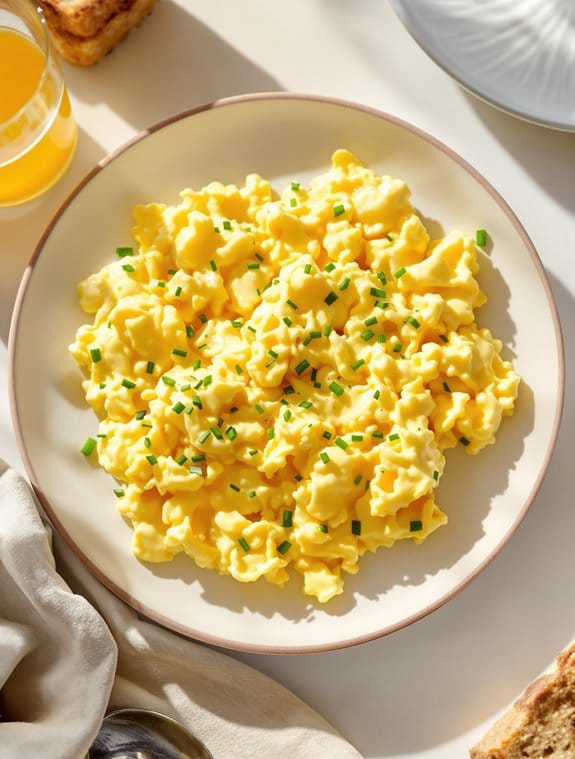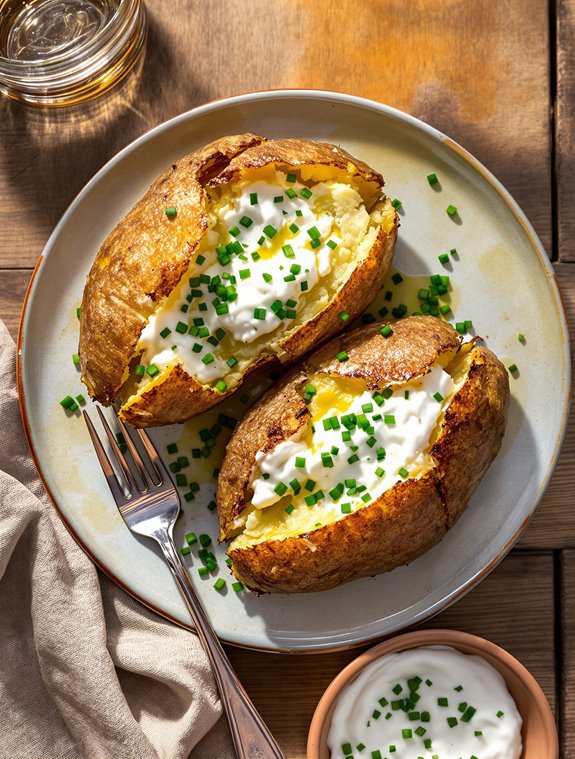Why You’ll Love these Creamy Double-Boiler Scrambled Eggs
If you’ve ever been disappointed by dry, rubbery scrambled eggs, this double-boiler method will change your breakfast game forever.
The gentle, indirect heat creates impossibly creamy curds that melt in your mouth—nothing like those tough, overcooked diner eggs we’ve all suffered through.
I love how these eggs develop large, pillowy curds with minimal effort. Just patient folding, not frantic stirring.
The heavy cream adds richness without making them soupy, while the fresh herbs brighten everything up.
Plus, this method gives you a foolproof timing cushion, unlike direct-heat cooking where seconds mean the difference between perfection and disaster.
What Ingredients are in Creamy Double-Boiler Scrambled Eggs?
The secret to luxuriously creamy scrambled eggs lies not just in the cooking method, but in the quality ingredients you use. For these double-boiler scrambled eggs, we’re keeping things simple with just a few high-quality components that work together to create that silky, tender texture that makes this dish so special. Nothing complicated here, just good ingredients treated with respect—the way all great cooking should be.
- 3 large eggs
- 1 tablespoon heavy cream
- 1/2 tablespoon butter
- 1/4 teaspoon kosher salt
- 1 tablespoon snipped fresh herbs of choice (chives, chervil, parsley, or tarragon work beautifully)
When shopping for these ingredients, I recommend seeking out the freshest eggs possible—farm-fresh if you can get them. The fresher the egg, the brighter the flavor and the more vibrant the texture. As for the herbs, this is where you can get creative. Chives offer a mild onion note, tarragon brings a subtle licorice hint, while parsley keeps things classic. Don’t have fresh herbs? You could skip them, but they really do elevate the dish from everyday to something special. And that heavy cream? Don’t substitute milk if you want that signature creamy texture—those few extra calories are worth every bite.
How to Make these Creamy Double-Boiler Scrambled Eggs

The magic of these velvety scrambled eggs happens in a double boiler, which provides the gentle heat that transforms ordinary eggs into something extraordinary. Start by heating 1-2 inches of water in the bottom of a heavy saucepan or double boiler until it’s just simmering—not boiling.
While that’s warming up, crack 3 large eggs into a small mixing bowl, add 1 tablespoon of heavy cream and 1/4 teaspoon of kosher salt, then whisk with a fork until the mixture is fairly homogenized. No need to overdo it; we’re not making meringue here, just breaking up the whites so they blend with the yolks.
Next comes the essential part. Place your stainless mixing bowl or double boiler top over the simmering water and add 1/2 tablespoon of butter, swirling it as it melts. When the butter is completely melted, pour in your egg mixture. If you see instant action around the edges of the egg, your heat is way too high—pull back and adjust. This is a slow dance, not a race.
As the eggs begin to cook, you’ll notice curds forming from the bottom. Using a spoon or spatula, gently lift these curds to the top, allowing the uncooked egg to flow beneath. Patience really pays off here.
As the cooking progresses, your technique will shift from stirring to more of a lifting and folding motion. When the eggs are almost set but still look a bit wet, remove them from the heat immediately. Remember, they’ll continue cooking slightly from residual heat, so timing is everything.
Want smaller curds? Simply chop the eggs a bit and give them a light stir. The final touch—and what truly elevates these eggs from breakfast to brunch—is a sprinkle of 1 tablespoon of snipped fresh herbs. Chives, chervil, parsley, or tarragon all work beautifully, adding both color and a subtle flavor enhancement.
Serve immediately on warm plates for the ultimate creamy scrambled egg experience.
Creamy Double-Boiler Scrambled Eggs Substitutions and Variations
While mastering the technique is half the fun, personalizing these creamy double-boiler eggs makes them truly your own.
I often swap the heavy cream for crème fraîche or Greek yogurt when I’m feeling fancy. Not a butter fan? Try olive oil or even a touch of duck fat—game-changer, trust me.
The herbs are your playground. Sometimes I go Mediterranean with basil and oregano, other times French with tarragon.
And cheese? A little grated Gruyère folded in right at the end creates pockets of gooey goodness.
For protein-packed mornings, I gently fold in smoked salmon or prosciutto after cooking. Divine.
What to Serve with Creamy Double-Boiler Scrambled Eggs
Because these creamy double-boiler scrambled eggs deserve proper accompaniments, I’ve spent years perfecting the supporting cast for this breakfast star.
My go-to combo includes buttery sourdough toast, crisp bacon (not too crunchy), and sliced avocado with a sprinkle of flaky salt.
For a more substantial meal, try serving them alongside roasted potatoes with rosemary or a simple arugula salad dressed with lemon and olive oil.
A small bowl of fresh berries provides the perfect sweet counterpoint.
Want to impress guests? Pair with smoked salmon, capers, and thinly sliced red onion.
Trust me, they’ll beg for your secret.
Final Thoughts
After mastering these double-boiler scrambled eggs, you’ll never return to high-heat cooking methods again.
The gentle, indirect heat creates a texture that’s impossibly creamy and luxurious—unlike those dry, rubbery diner eggs we’ve all suffered through.
I’ve converted countless friends with this technique. The patient approach pays dividends in flavor, letting you truly taste the eggs rather than just rushing through breakfast.
Sure, it takes a few minutes longer, but isn’t your morning meal worth it?

Double-Boiler Scrambled Eggs
Ingredients
Equipment
Method
- Fill the bottom of a heavy saucepan with 1-2 inches of water and bring to a gentle simmer (not boiling).
- In a small mixing bowl, crack the eggs and add the heavy cream and kosher salt. Whisk with a fork until just combined, without overbeating.
- Place your stainless mixing bowl or double boiler top over the simmering water. Add the butter and swirl until completely melted.
- Pour in the egg mixture. If the eggs start cooking immediately at the edges, your heat is too high – adjust accordingly.
- As curds begin to form from the bottom, gently lift them to the top with a spoon or spatula, allowing uncooked egg to flow underneath.
- Continue with a lifting and folding motion rather than stirring. When the eggs are almost set but still look slightly wet, remove from heat immediately.
- For smaller curds, lightly chop the eggs and give them a gentle stir.
- Sprinkle with the fresh herbs and serve immediately on a warm plate.



